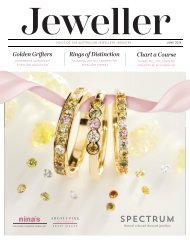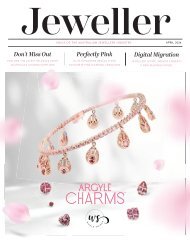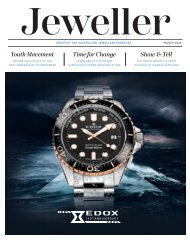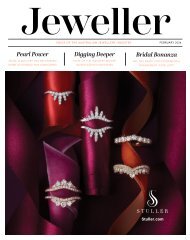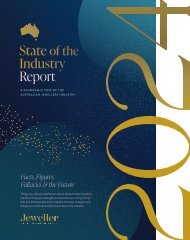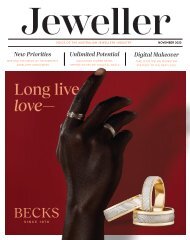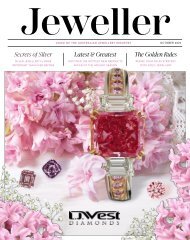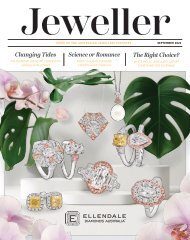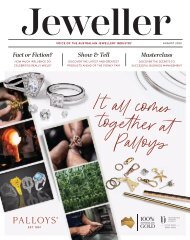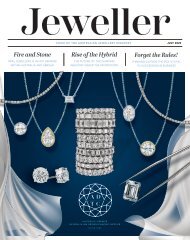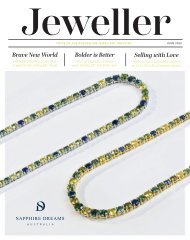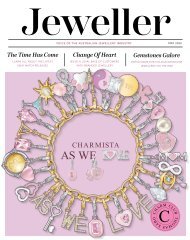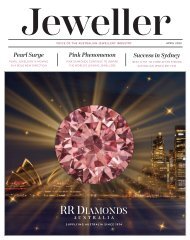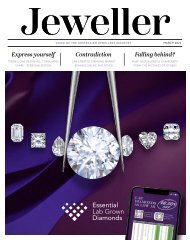Jeweller: The Great Diamond Debate - Round II
Facts Vs Marketing: In 2019, both natural and man-made diamonds battled for the hearts and minds of consumers – and the gloves came off. While the dust is far from settled, the question remains: can consumers really make an informed choice in the midst of a marketing barrage and an increasingly confused industry?
Facts Vs Marketing: In 2019, both natural and man-made diamonds battled for the hearts and minds of consumers – and the gloves came off. While the dust is far from settled, the question remains: can consumers really make an informed choice in the midst of a marketing barrage and an increasingly confused industry?
You also want an ePaper? Increase the reach of your titles
YUMPU automatically turns print PDFs into web optimized ePapers that Google loves.
GEMOLOGICAL INSTITUTE OF AMERICA<br />
Sustainability and gem tracking<br />
have arrived in force<br />
R USSELL SHOR’S KEY POINTS:<br />
Sustainability, fair practices and provenance have become key concerns for consumers<br />
<strong>The</strong> natural diamond industry has taken great strides in ensuring supply chain transparency in 2019<br />
<strong>The</strong> challenge for diamond companies and retailers is to counteract lingering negative sentiment<br />
This year, businesses have begun to take action<br />
towards consumer concerns about sustainability<br />
and the origins of the products they buy.<br />
Many sectors, including the diamond and jewellery<br />
industries, have created initiatives to support<br />
sustainability standards. Even the world’s major<br />
financial markets are developing indices that<br />
address investor concerns about environmental,<br />
social and governance (ESG) issues, and are<br />
integrating them into fund trading.<br />
A Financial Times report, published in October<br />
2019, noted that ESG issues have taken their<br />
place alongside important financial performance<br />
indicators, such as yield and return, for investors<br />
looking at new investment opportunities. This marks<br />
a profound shift from just a few years ago.<br />
<strong>The</strong> reason? Investors, especially younger ones,<br />
demand it.<br />
All businesses along the diamond and jewellery<br />
supply chain – from mine to market – have<br />
embraced this movement as consumers<br />
become more concerned about sustainability,<br />
including sound environmental and fair labour<br />
practices, fair returns to communities, and<br />
women’s empowerment.<br />
Along with sustainability, consumers also want<br />
to know where their gems, and even their gold,<br />
come from.<br />
THE INDUSTRY PERSPECTIVE<br />
<strong>The</strong> strength of industry sentiment toward these<br />
topics was evident by the standing-room only<br />
crowds at two seminars on the subjects at the JCK<br />
Las Vegas show in June.<br />
One was sponsored by GIA (Gemological Institute<br />
of America) and the other by the Responsible<br />
<strong>Jeweller</strong>y Council (RJC).<strong>The</strong> messages were clear<br />
in both seminars: consumers are increasingly<br />
demanding that their gems, diamonds and precious<br />
metals be ethically sourced.<br />
In the consumer’s view, the responsibility for this<br />
extends through the entire value chain.<br />
At the GIA panel, ‘Embracing Sustainability Amid<br />
New Consumer Expectations’, moderator Susan<br />
Jacques, GIA president and CEO, acknowledged<br />
that, despite significant efforts – including the<br />
Kimberley Process and the establishment of the RJC<br />
– consumers have harboured negative impressions<br />
of the industry for years.<br />
<strong>The</strong> five panellists – Dr Saleem Ali, of the University<br />
of Delaware; Marcus ter Haar, CEO of Okavango<br />
<strong>Diamond</strong> Company, Botswana; Lisa Bridge, CEO of<br />
US retailer Ben Bridge Jeweler, which operates more<br />
than 80 stores; Swarovski executive Nadja Swarovski;<br />
and Claire Piroddi, the sustainability manager for<br />
watches and jewellery at French luxury group Kering<br />
– detailed the efforts of their organisations to<br />
adopt sustainability programs and counter the<br />
lingering negativity.<br />
Ali, a professor of energy and environment, said,<br />
“<strong>Jeweller</strong>y may be a luxury product that not<br />
everyone needs, but it does sustain a standard of<br />
living for many people who work in the gem and<br />
jewellery supply chain. <strong>The</strong>se workers can create<br />
wealth and economic growth from the elements of<br />
the Earth.”<br />
He added that the conditions must be there to<br />
enable them to do so.<br />
Ter Haar cited the benefits diamonds have brought<br />
to Botswana, “It’s the circles of sustainability:<br />
people, planet, profit. In Botswana, we’ve seen our<br />
capital [Gaborone] grow from a small town to a<br />
progressive, modern city, [with] a great increase<br />
in life expectancy, [and] free health care – all<br />
from diamonds, which account for 50 per cent of<br />
government revenue and 30 per cent of GNP. Every<br />
diamond purchased represents food on the table.”<br />
Swarovski told the audience, “Today, companies<br />
must think of others as well as themselves.”<br />
Her business focuses on three basic principles:<br />
positive production, women’s empowerment and<br />
fair partnerships.<br />
Meanwhile Piroddi stressed that “95 per cent of<br />
luxury products come from nature, so we must take<br />
care of our environment.”<br />
She also revealed that in a company survey done<br />
for its fashion brands – including Gucci, Yves Saint<br />
Laurent and Alexander McQueen – “75 per cent of<br />
people care where their products come from [and]<br />
they are more informed than ever.”<br />
Finally, Bridge told the audience, “Sustainability<br />
begins at home.” She noted that her company<br />
supports community organisations in each town<br />
where it has stores.<br />
At the RJC panel, ethically sourced products<br />
occupied much of the discussion. <strong>The</strong> moderator,<br />
RJC executive director Iris van der Veken, stressed<br />
that sustainability is a shared responsibility across<br />
the entire value chain.<br />
“Trust and transparency are the new equity,” van der<br />
Veken noted. “People want to have confidence that<br />
their purchases do some good.”<br />
One of the most difficult areas for the incorporation<br />
of sustainable sourcing practices is artisanal mining,<br />
December 2019 <strong>Jeweller</strong> 23




